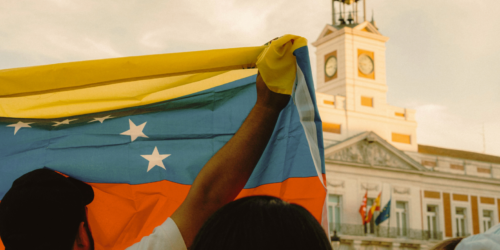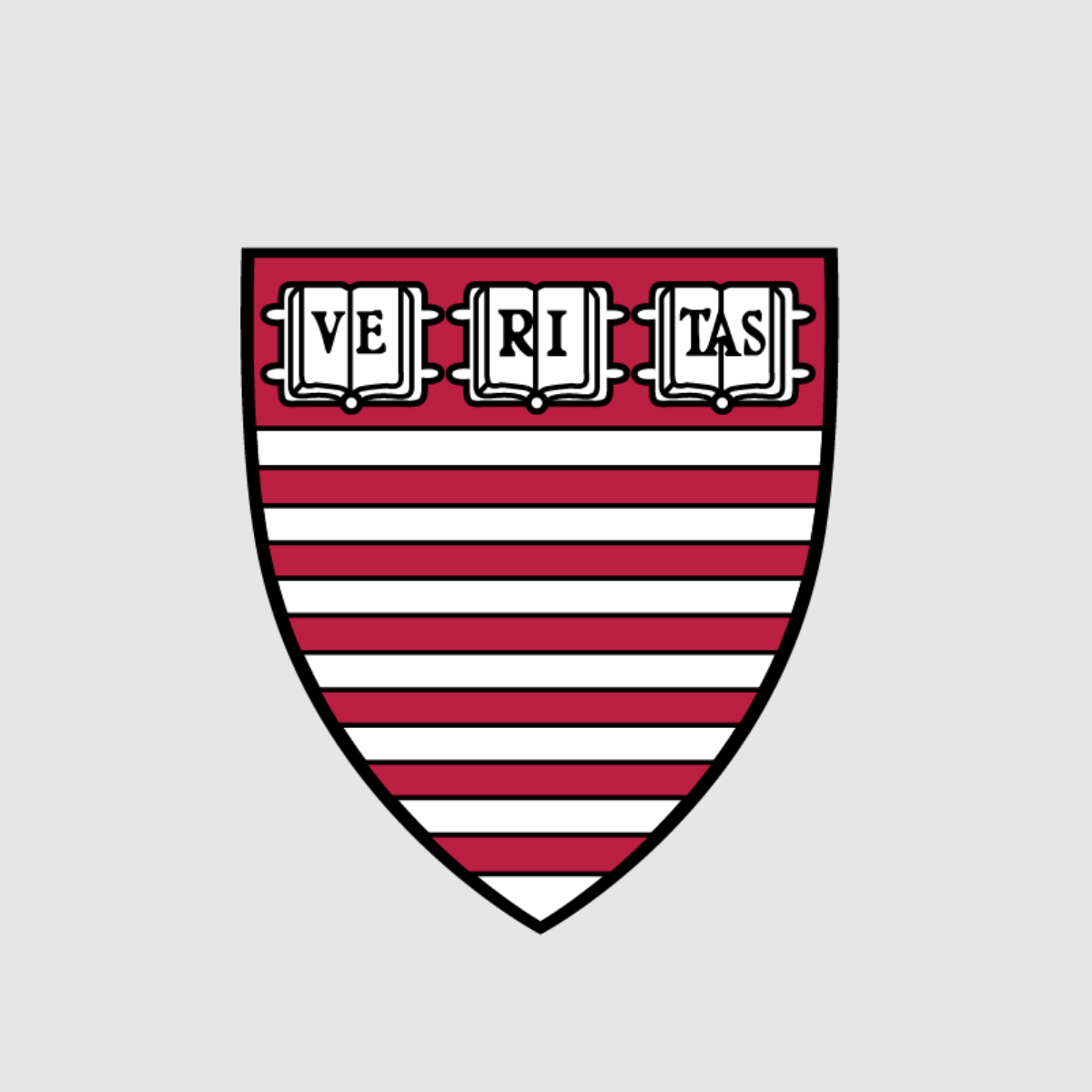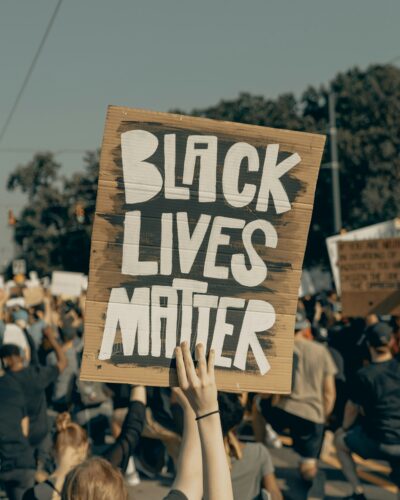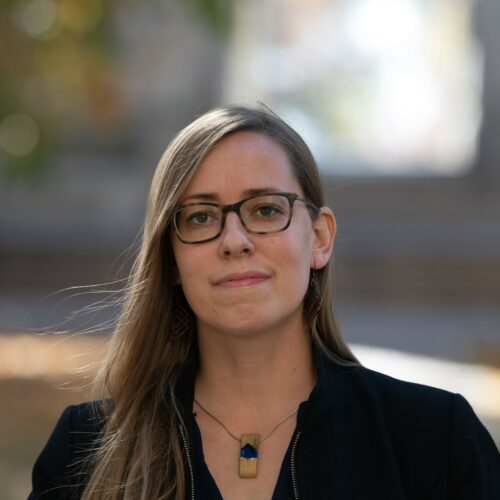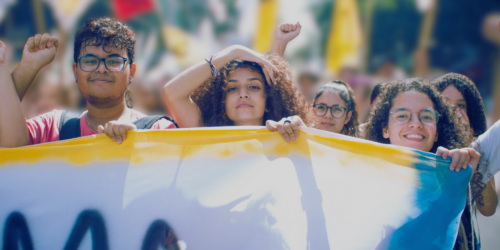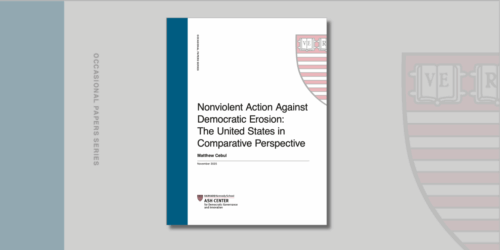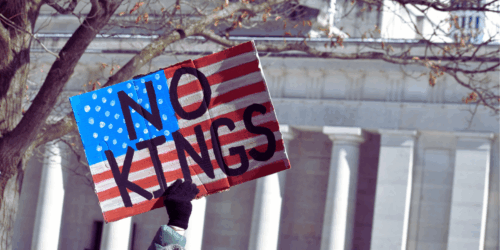Jay Ulfelder: You are listening to the Nonviolent Action Lab podcast. I’m your host, Jay Ulfelder, he/him. Together with Harvard Kennedy School professor, Erica Chenoweth and other members of the Nonviolent Action Lab team, each episode we bring you the latest research, insights and ideas on how nonviolent action can or sometimes fails to transform injustice.
Today, we’re going to be talking about what some people call the George Floyd uprising, the massive surge of activism around racial justice and police brutality that swept the United States in the summer of 2020. The Black Lives Matter movement certainly wasn’t new that year, and the issues it seeks to address are older than our country. Even so, Police Officer Derek Chauvin’s murder of Floyd on May 25th, 2020 sparked what was, as measured by the number of associated events and participants in them, probably the largest protest movement in US history. Rather than discussing the movement writ large, we’re going to take a close look at one small strand of it, a case study of organizing an action spurred by Floyd’s murder. And we’re going to do that by talking with Desiree Weber.
First, we’re talking with Desiree Weber. Desiree is an associate professor of political science at the College of Wooster in Wooster, Ohio. She’s also a founding member of the Wayne County Racial Justice Coalition, which held public demonstrations against racial injustice for 1,221 consecutive days, starting in June 2020, and work to reform the Wooster Police Department policies on chokeholds and no-knock warrants. So, Desiree, thanks very much for making time to talk. It’s great to finally connect. I’m hoping you can take us back to June 2020 to start. I’m wondering what was happening in Wooster and how the Wayne County Racial Justice Coalition got started?
Desiree Weber: Yeah, absolutely. Thank you so much for having me. So May 25th, 2020 was the day that George Floyd was killed by a police officer in Minneapolis, Minnesota. And that news percolated and spread and many people across the country and of course even across the world started paying attention to the story and learning more and more about the details of his killing. And that, of course, too, was happening in my community in this small town of about 26,000 people in northeast Ohio.
We were of course a few months into the Coronavirus pandemic, and I think everyone was just paying attention to the news maybe a little bit more than maybe in other eras or in other times when a global pandemic wasn’t sort of keeping everyone from some of the activities that we otherwise be engaged in. And that event George Floyd’s killing, and again, all of that kind of information and the video and the descriptions and so on that were coming out about it here in my little town, as in so many other places, sparked something.
It’s not novel what happened here in a lot of ways, but it led people to come out to our little town square. It’s just the intersection of the two main roads in our downtown. And people started congregating there. There was a vigil that someone organized, I think on that Friday, if I remember correctly, maybe the 28th or the 29th. So a few days after the initial news had broken.
Initially, the idea was just that from that evening of that vigil of a maybe 50 to 75 people gathering on our little town square to keep the demonstrations going, and to keep having a public presence to mark what had happened, to express our dismay, our concerns, to publicly demonstrate that this wasn’t acceptable in so many different ways. Initially, the idea was maybe just to gather people that are my friends or my colleagues to try to keep demonstrations going until Juneteenth.
So until June 19th of that year, just to bridge what I knew was already planned for the June 19th event from the local NAACP chapter. And that was the initial idea. We lasted many more days than that in the end, but that’s where it started, that kind of context.
Jay Ulfelder: What was the process of deciding to make those demonstrations routine? I mean, at some point there must’ve been conversations after Juneteenth around that. What did that look like?
Desiree Weber: Yeah. A little bit hard to recollect, but I really do kind of want to emphasize how organic this was. I mean, there is of course a little bit of planning and some decisions and some conversations where things get nudged in a particular direction versus a different one. But even in those first couple days after the vigil, I think I ended up texting maybe about 10 or so people again, that June 1st, 2020, a few days after that initial vigil on that, I think a Monday.
But over that weekend, various just individuals or small groups of people would come to the town square. And I happened to live really close to it, so I can see often when people are there and people would just come and be there. It wasn’t large crowds and it wasn’t organized. The vigil was a thing that was somebody set the time and somebody put it on Facebook and somebody talked to other people to come.
But then in those preceding days right after that, it was just spontaneous. And it was, again, sort of small clusters of people over that weekend. And then my thought on that following Monday on June 1st was I don’t want people to just go back to the regular work week. This idea that this travesty has happened that is so indicative of so many other problems that we’re facing. It’s obviously in a lot of ways, not just about George Floyd wasn’t something that I was willing in that moment to let fade away again.
So that Monday I just texted, I think, yeah, 10 my friends and was like, “Hey, anybody interested or willing to come?” I think initially I set the time over the lunch hour like 12:30 to 1:30 or something like that to come still bear public witness basically in this place that people had been on and off gathering.
And from there, so to get back to your actual question about how it then precipitated to go much past that, even first Juneteenth, it was just people showing up and it was certainly friend networks or colleague networks or family networks where somebody would bring their dad or somebody would bring their grandchildren or somebody would bring their friends or colleagues or acquaintances or whoever.
So it was definitely through various networks and so on, but it was just that people kept showing up and that we made a thing that was regular. And so there was a predictability to it. It ended up being noon to one after the first couple of days. And that kind of regularity, especially, again in part during a pandemic where people were quite disconnected from some of their regular networks of care or of interacting with people or even colleagues, it just became a thing that people came to.
It’s not to say that everyone came every single day of that. There’s definitely various people came for a number of weeks and then not, or somebody maybe was just there for a day or maybe once every week or something like that. So there’s definitely ebbs and shifts in who’s there and how many people are there, but it just spiraled because it was a place to gather, and it was a regular time and a regular place, and that was something that a lot of people picked up on and responded to.
Jay Ulfelder: I feel like in something that doesn’t get discussed much in at least the literatures I’m familiar with in political science and sociology about social movements and protest activity, that has become much clearer to me in the last few years of more focused research on them is the centrality of community and community building and the experience of that community in motivating and mobilizing people. And it sounds like that’s a big part of what was going on here.
Desiree Weber: Yeah, absolutely. I think that this wouldn’t have been possible, this wouldn’t have happened. The longevity and the number of people over the number of years that were involved in this, it wouldn’t have been possible by trying to convince people to do it, if that makes sense. Even the best crafted appeal would be enough, at least. I’m not saying it wouldn’t help. I’m not saying we didn’t reach out and some people came because of that, but I think that if people didn’t have their own motivations, interests, concerns, and a lot of those are tied up with community, then it wouldn’t have worked the way that it did.
So I think that for lots of people, it was a moment of thinking about community in lots of different ways, or at least having a sense that there’s something going on with community. Maybe they weren’t all super self-reflective about it, but this notion that this community too, again, a predominantly white community in Northeast, Ohio that’s relatively small, that here too, this is a set of issues that needs to be talked about and that needs to be something that we talk about and demonstrate about in public, that it’s not just conversations between friends or so forth, that it’s more than that.
Jay Ulfelder: You all are called a coalition. I’m wondering who the organizations are that are part of the coalition, and then if there was much self-conscious discussion about demands, for lack of a better word, objectives, that kind of thing, or maybe not given how organic this was. Anyway, I’m wondering about that.
Desiree Weber: Yeah, absolutely. I’m going to try to break that question down into a few, and then remember all of them. Please prompt me if I forget a part of this. So the name Wayne County Racial Justice Coalition probably only came about much later that summer. I want to say August-ish of 2020. And so in some ways, that coalition question is the last part of that summer at least. So again, thinking about it from just people, individuals, small groups of people came together on the Square, continued to come together, a lot of us came to the NAACP chapters organized event for Juneteenth on that same downtown square where there were 600 people, which for a town of 26,000 is a huge number at one event that is a public demonstration or a public event to commemorate something like Juneteenth. And soon after that, a few of us started thinking about what do we do now? What is the next step?
So I think one of the first things that we did that summer, so later June into July 2020 was to organize a public petition. And the aim was to… I mean, it was addressed to the Wooster City Council and to the mayor of the city. And that petition was aimed at getting them to have conversations about these issues. We didn’t include specific demands in that letter because it was just an initial foray to say, “Hey, there’s a lot of people in this community who care about issues of at least broadly speaking, police violence and racial equality, again, without kind of detailing particular demands.”
We gathered signatures for that and we ended up with, I want to say somewhere north of 300 signatures, presented that to the city council and to the mayor, and we’re rebuffed in a number of ways. One is that the petition, the body of the letter that we signed, that people then appended their signatures to the body of that letter wasn’t a suggestion for an ordinance to be passed. And so there was sort of technical issues in terms of this is not itself a piece of proposed legislation where we have written the content of that legislation and then gotten people’s signatures to support it.
It was more of a public letter, if you will. So anyway, there’s various sort of travails and intersections with the Wooster City Council and with the mayor and other government or other local officials on these questions. But that was our first big organizing effort to really bring people together a bit more than just, I’m going to say, coming together on the square in a physical way on whichever days they could attend. And so we started putting together an email list of people that were coming to the square and they could choose to sign up.
And that email list was kept by me. And then we started doing, I think first weekly newsletter updates through that list, through that email list. And so those included everything from what’s literally going on locally, what’s the status of the petition? Where are we at? When’s the next city council meeting? What other issues are going on? But also included things nationally, what’s being done? Is there being anything done in other places? What’s the news out of Minneapolis? These kinds of things. Are there funds that people can contribute to if they’re interested in these events? You get the picture. Right?
Jay Ulfelder: yeah.
Desiree Weber: And then from those letters and from that organizing in terms of emails and that initial petition, I started organizing twice monthly policy sessions. So conversations online, again, still in the depths of the pandemic. So over Zoom or teams or whatever the mechanism was for people who were interested in what is happening at the local level. What can be next steps in partnership with other organizations? Who else is doing something that we might want to be involved in?
How do we organize ourselves? And so maybe that then gets back to your initial question, which is the coalition. And so again, by the end of that summer, again, I want to say sort of August 2020, we got to the point where the Wooster-Orrville chapter of the NAACP, again, our local NAACP chapter was resuming meetings. I think they had taken… No, maybe they met all that summer, but the local NAACP of course, was an organization that many of us had known about some of us were even a part of already.
So there was a political action committee of the NAACP, and there were various local religious organizations, the Universalist Unitarian Church first, and in some ways, foremost among them that had their own subcommittee or reading group or kind of locusts of people in that organization that were interested and cared about these issues. And so we had these meetings, and then we had NAACP meetings. And then we had, again, local church or community group meetings, and lots and lots of conversations happening.
But also then this question that I think you raised, which is, so who’s doing what and which organizing is happening where? And so this idea came about that because there’s so many overlaps and intersections of the people involved, lots of the folks on the square coming to demonstrate were members of the Unitarian Universalist Church, and that’s a group. Lots of us were already NAACP members. Lots of us were in various others spaces already.
So the idea of using the word coalition came together because we didn’t want to separate this organization or burgeoning even group of people, wasn’t even yet an organization from all of these other efforts because we were largely speaking, already overlapping in so many different ways.
Jay Ulfelder: Got you. More like a network than a new group.
Desiree Weber: And so maybe network, maybe it would’ve been a better term. I don’t know. We were banding a year-round kind of terminology.
Jay Ulfelder: That’s not a critique. Just an observation.
Desiree Weber: This too was one of the items on the agenda, for one of the policy discussions of like, “Yeah, what do we do here? What’s the move forward?” So that’s how that came about.
Jay Ulfelder: Got you. I’m wondering what you see as the coalition’s big accomplishments. I mean, I think we talked about one in the introduction, and maybe that’s it, but I’d just be interested in your encapsulation of what you all got done.
Desiree Weber: Yeah. I think that it’s probably two big things that stand out to me, but maybe actually, I’ll add a third. So I think three things that the Wayne County Racial Justice Coalition accomplished. One is bringing people together. And it’s not to say that we’re the only ones that did it. It’s not to say that this was the only place that people came together or anything like that. But I do think that one of the things that this kind of effort, this group of folks, this way of doing things helped to do is to bring folks who might not have come to an NAACP meeting or don’t have time to attend a meeting like that, or don’t know how they can help.
They came to the square to demonstrate. And again, maybe just one day, and maybe they came back the next Saturday, and then maybe that was it. But it brought people into the conversation that hadn’t previously been, or maybe again, weren’t connected to some of those other networks. And so I think that’s one thing. I think the second thing is hopefully just the publicness of those demonstrations.
Again, it was over a thousand days of consecutive demonstrations of in rain and shine and we get a lot of snow in Northeast, Ohio. There’s various obviously conditions throughout those years that there was at least two people on the square every day. And that kind of publicness, I think to me is really important thing because I think that in a community like this, again, it’s small, it’s politically a little bit more conservative than some other places, especially bigger cities, et cetera.
You have certain kinds of politics that get demonstrated in public, but you don’t always have this kind of politics or these kinds of issues that are present and daily addressed by people in public. And so that’s sort of signaling that kind of, if you two have concerns about these issues, there are other people that care about those issues. Right?
Jay Ulfelder: Right.
Desiree Weber: That kind of publicness that I think was important to me and I think was also important to other people. And then thirdly, I’ll say that one of the other accomplishments of the coalition was in 2021 by that spring about May of 2021, we had both requested proof, Freedom of Information Act, some of the policy manuals of the Wooster Police Department in terms of what their actual specific, not only public policies are on chokeholds and no-knock warrants and a number of other issues, but what their sort of training around those issues is.
How do they talk with their recruits, with their fellow officers about these issues? And we started a series of meetings with the Wooster Police Department that involved members of the coalition that involved the president of the local NAACP chapter that involved a number of people to talk with the chief of police, Matt Fisher and the assistant chief about these particulars.
And I really do mean particulars. We went through the policy manual and identified sentences and paragraphs and phrases that we had questions about, and then that we came back to subsequent meetings with proposed changes to, and that was a number of meetings and back and forth, and those were productive conversations for the most part. And then resulted, again, as I said in May 2021 in the Wooster Police Department actually changing the policies that we had identified.
And the vast majority of changes we proposed were ones that they adopted. So they changed the category of the use of force that chokeholds would be categorized in. And that sounds like a very technical thing, but the result of that means that they see that use of force as equivalent to lethal use of force of a gun. And so it recategorized it to highlight and identify its severity and the really last resort that it needs to be if an officer is ever in a situation of having to use that.
There was a lot of conversation about whether that’s the right move, whether we should just push for an outright ban. And the police department told us pretty pointblank, pretty straight up, “If we ban it won’t prevent it from never being used. But if we categorize it as the same level as the lethal use of force with a weapon, then there’s parameters around that. And then certain kinds of follow-up if that were to ever transpire in terms of was that an appropriate use of force and consequences in that direction.”
So maybe this is getting too much into the weeds, but again, the point is that the third kind of big upshot, or the third big accomplishment I think of the Wayne County Racial Justice Coalition was the negotiation of changes to the Wooster Police Department policy.
Jay Ulfelder: Yeah. No, I appreciate all that and the detail, and that you brought up all three of those. I think there’s so much of the discussion around this particular movement and movements like it on the, did it matter? Did it make a difference? Sticks at the level of policy, which is important and obviously have real consequences. But I really appreciate you bringing up the other two elements as well. It’s this sort of building connective tissue and cardiovascular system of whatever you want to call it, of organizations trying to push politics in a certain direction.
It seems like it’s harder to see from the outside and from a distance from high up in the sky, but can have really profound and lasting consequences for how politics works.
Desiree Weber: Yeah, I think that’s absolutely true. I mean, at this point, we’re not demonstrating daily anymore, but when other political issues have come up, there are still definitely networks of people that there’s still a WhatsApp group chat going on. There’s still other channels that people are talking to each other about, for example, what’s happening in Israel and Gaza or when Ohio just went through a vote on abortion rights. Or again, various other kinds of topics which seen from one particular perspective aren’t the most closely tied to the Black Lives Matter movement or racial justice question. But of course, we all know have certain linkages and certain conditions that tie them together.
And maybe more importantly, that tie people here together that tie networks of people together who are concerned not in a seeing the world through a straw kind of way, but seeing the world in its complexity and all of the ways that different political issues really are connected, or that, again, at least that there are people who care about these kinds of issues in a general sense and know how to contact each other and know how to organize if that’s the next move on a particular issue, or just know how to communicate with each other to commiserate sometimes.
Jay Ulfelder: Right. I wanted to ask about the decision to stop gathering daily. What was that right around Christmas time last year 2023? I imagine that was a hard decision. How did that come about? What was that conversation like?
Desiree Weber: Yeah. The decision to stop was a difficult one in a lot of ways, but it wasn’t a conversation that we had had for the first time in December, or in the run-up to December 2023. In fact, even when I was first organizing those policy meetings that were bimonthly for quite a while, periodically, I want to say maybe every couple months or so, I would get inklings, “Oh, we’re kind of dipping in numbers a little bit in terms of daily demonstrations or people that are coming to them.” And I would put it on the agenda for discussion, “Is this the time to consider maybe ceasing the expectation of having people show up daily?”
And so this would happen as kind of a periodic conversation. And there was a time in the fall of 2022 when I was preparing to go on my research leave from my academic job, and I was moving out of the country for six months. And so my role in this was changing pretty drastically. I was going to be removed six time zones and a number of thousands of miles away. And so that was a point at which that conversation was had, but people picked up the pieces that I had been carrying, and the demonstrations continued for a whole another year after that.
And so my point is just to say that we kept getting to the point where we thought, “Well, I don’t know, maybe there aren’t enough people to really sustain this anymore.” Summertime was sometimes difficult because people were in other places visiting family or on vacation or just other things came up where their children were home from school, and so they had less flexibility in their schedule or just various things.
So we just kept coming to the point of saying, “Hey, let’s check in with each other and see if this might be the time that we call it.” And it kept just not being the time to call it. It was heartening every time it happened. And then by the late fall and so on of 2023, it was getting to the point where it was kind of a core group of, I’m going to say 10 to 12, to at the stretch, 15 people who they wouldn’t all show up every day, but there was probably at least four or five or six that would show up on a daily basis.
But it really had come down to the core set of folks. There weren’t really new people joining anymore. They might still be intersecting with the NAACP or other ways, but there weren’t as many people showing up to the square being like, “Oh, hi, can I join you?” And joining. So it had just gotten to the point where due to kind of numbers, but again, just the fact that those numbers had just kind of solidified in a very particular way and that it really was kind of resting on the shoulders of a very identifiable set of people and wasn’t kind of this organic, “Oh, ebbs and flows anymore.”
It had settled into a very specific pattern that we came to the decision to… First, I think we went to once weekly, but it quickly became clear that let’s go through December 2023. Let’s get to that mark, and then let’s not.
Jay Ulfelder:
Gotcha. On to the next. You alluded to this a little bit earlier with… I wanted to ask about backlash as well. I’m wondering if there were any sort of general sources of pushback, community response, particular organizations, individuals, or maybe just particularly hard days, counter protesters, whatever it might’ve been. But nationally, I know this was certainly a period that was at least the early wave of this characterized by pretty intense backlash in many places. So I’m wondering how that was for you all?
Desiree Weber: Yeah, absolutely. The question of reaction and backlash, and maybe I want to separate those two just a little bit is a really important one. So I’ll start by maybe just describing a little bit more in detail how we were demonstrating in public. So again, as I mentioned, the little town that I live in, 26,000 people, there’s a little core downtown. There are two main streets that intersect at the center of it. And the courthouse is on one corner and there’s open space, a gazebo, things like that on the other three corners. We would always station ourselves at one of those particular corners.
And from early on, from the very first set of days of demonstrating, the intention was to hold signs outward facing to the street. It was passersby and for people in their cars and for people who are walking on the sidewalk and so on, to intersect with our message with what we were thinking and being worried about. And so that was always the focus that it was for people who are passing through that intersection for people who are passing through that part of the community to engage with us.
And so the first set of reactions that were the most prevalent and the most everyday were, of course, then people in cars or people that are walking by. We definitely had a huge gamut of reactions on most every day that we were there. So people honking in support, sometimes people shouting things out the window, again, sometimes shouting good things out the window. Sometimes people shouting epithets of disagreement or even more strongly worded language out the window.
Sometimes people revving their engines. Again, we live in a relatively rural community, or at least the surrounding county is quite rural. So you have the big pickup trucks, especially during the sort of 2020, 2021 era with flags off the back and these images that we’ve seen over and over again. So there’s definitely that very almost visceral engagement with someone, even if just for a few moments as they’re stopped at the red light or even we had some people that would go around the block and give us a second pass.
So there was definitely that. There were also people who would stop their cars and park nearby and come over and talk to us. And again, that too ran the gamut of they weren’t from the community, or they had seen us for the first time and they stopped and they wanted to have a conversation. And some of those, again, were on the one side of the spectrum, which was, “Wow, I didn’t know that other people were paying attention to this too, and wanting to have a conversation.” And then other people who are very angry with us, who are very upset.
And lots of folks who interpolated what we were there for as accusing them of being racist, for example, or various disagreements about, I don’t know anything from details of what actually happened in George Floyd’s murder to accusations about what “defund the police” means to accusations about what the Black Lives Matter national organization was up to. Again, all kinds of different things that people were upset about, that we would then have either conversations or sometimes they would yell at us, and then they would eventually go away.
So there’s this role again in the moment out in public intersection with people and their various different positions vis-a-vis what we were there for. And then I would say the other kind of places that we were negotiating, a lot of this was, again, at Wooster City Council meetings where we organized to have people go to meetings and give public comments. Although I guess I should actually say over that Summer City Council meetings were still online because, again, of the pandemic. And so figuring out how Ohio ordinance and Wooster policy on giving public comment at city council meetings worked. What were the technicalities of that?
And then organizing people to attend those meetings, whether online or eventually in person. And the kinds of resistance that various members, including the mayor and a few folks on city council would push back against us. So just negotiating that. There was a suggestion at one point for a public declaration by the City of Wooster that racial inequality is also understood to be a health pandemic that has a set of health effects. That went nowhere. And various conversations about passing ordinance to change Wooster Police Department policy, because there’s a question of who is actually in charge of that policy.
If the Mayor passes ordinance or approves of ordinance passed by the city council to change Wooster department policy, then that is in fact how it happens. But it is also the purview of the Wooster police chief himself to change policy. And so there’s, again, kind of strategy question, and then where did we meet resistance? Where did we meet with some at least conversation? There were a few city council members who would have conversations with us and some who were in fact interested in these topics, but they were not the majority.
So again, resistance and backlash, both in the interpersonal, public visceral sense, as I was mentioning on the square itself in the public demonstrations, and then also at the institutional level or trying to work through or intersect with the various institutions here in Wooster.
Jay Ulfelder: Yeah. Gotcha. That segues I think into the last question I wanted to ask you, which was, as a fellow political scientist, I’m wondering how, if at all, you think your professional work and training shaped your activism, what you were doing. I don’t know how much experience you’ve had doing this kind of organizing before, so that’s another question, but what do you think about that?
Desiree Weber: Yeah. It’s a question that I’ve thought a lot about in the last several years. So my professional training as a political theorist, my research area is on language and its various ways that you can approach the question of language and its intersection with politics. So everything from, I study Ludwig Wittgenstein, a philosopher of language who didn’t really talk about politics at all, but who gives us a lot of really complicated ways to think about how meaning gets established.
I think about that, for example, in a political sense as how political concepts gain their meanings. And I pluralize that on purpose because part of how I understand the landscape of politics is to think about how people disagree about particular core concepts. If you and I have a different understanding of the word democracy then it is likely that you and I might come up with different practices of democracy that are central to our understanding of it.
So is voting, for example, the core of democracy, and as long as we protect that we’re still a democracy, or are there other practices that go along with and are also necessary for a healthy democracy to survive? So that just as an example of how political concepts, again, have these multivalent meanings and how that shapes how we negotiate our politics, our own political positions, but then also when we exchange those with others, when we come into contact with people, we especially disagree with how does, for example, our distinctions on understanding the concept of liberty shape, our reaction to COVID policies, for example. What is the government intrusion on your liberty and what is the government’s role in protecting public health?
So anyway, these just as examples to say, my academic work is studying language and political concepts and how we can use that to understand the political landscape. And so there’s an element of a tie between those kinds of questions and activism and public demonstrations and so forth. But that’s not where the organizing experience that I have comes from. And so I can’t draw on my archival research on Wittgenstein to think about how to get people to keep showing up for issues they care about.
So that comes from not specifically academic training, that comes from being someone who is obviously themselves, part of the political world. And I understand myself, of course, as a very small but part of the political landscape. So thinking about what actions do I want to take? There’s prior activism experience or organizing experience that I’ve had prior to this issue, but this was also the first time that I made this a core part of what I was doing in a daily way.
And so the confluence of those two things, I don’t know. There’s definitely ties that I can weave, but also there’s distinctions between my academic work and my activism work and my organizing work. The one I think informs the other and the other informs the one, but they’re not an overlapping set of circles.
I think I draw strength from that because both of them take so much effort and energy and perseverance and the setbacks that can happen in either of them that I think if I had them as overlapping circles that were contiguous, I think that I wouldn’t be able to use the one to draw from in strength for the other as much.
Jay Ulfelder: Right. Well, I really appreciate you taking time to talk with me today. This has been fascinating and learned a lot about your particular group and what was going on in Wooster, but also just really appreciated thoughtful conversation about this kind of mobilizing and activism.
Desiree Weber: Yeah, me too. This is an important part of how I understand my last several years as a member of this community and maybe communities, because I’m a member of the community of The College of Wooster. I’m also a member of the community of the City of Wooster, and those intersect and overlap in various ways. I’m also obviously a member of communities that are less geographically constrained than either of those two. And this has been just a really central set of issues, policy issues specifically of how we work toward racial equality in all places.
Again, even in sort of rural, smaller towns. And at the same time, a really important set of habits, and practices, and connections, and community-building that has sustained me as well in these last several years.
Jay Ulfelder: Yeah. And is clearly much larger and continuing to roll along.
Desiree Weber: Mm-hmm.
Jay Ulfelder: Well, thanks again, Desiree. It’s been terrific.
Desiree Weber: Thank you so much for your questions. I really appreciate the conversation.
Jay Ulfelder: Thank you for listening to the Nonviolent Action Lab podcast, hosted by me, Jay Ulfelder and produced at the Ash Center for Democratic Governance and Innovation at Harvard Kennedy School. Please rate and review us wherever you listen. You can find more information about the Nonviolent Action Lab and links to our work in the show notes below. See you next time.
